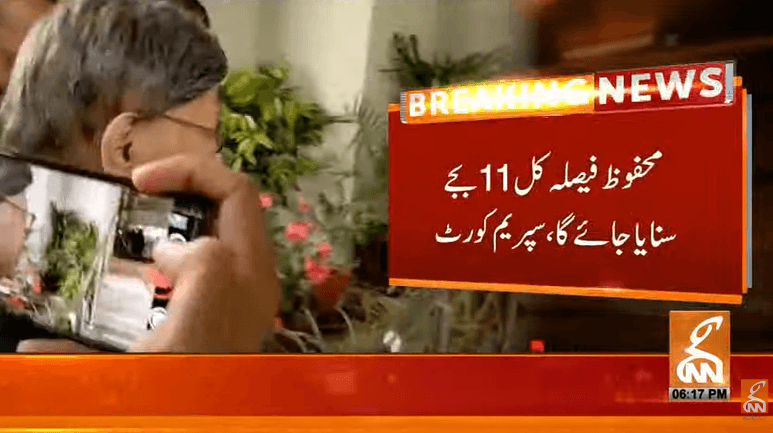SC to announce verdict on suo motu for elections in Punjab, KPK by tomorrow
The top court has directed the political parties to sit together and hold consultation over the date for elections in Punjab and Khyber Pakhtunkhwa.


Islamabad: The Supreme Court of Pakistan on Tuesday would announce the verdict in a case on suo motu taken to decide who has to announce a date for the elections in Punjab and Khyber Pakhtunkhwa.
A SC five-member bench led by Chief Justice Umar Ata Bandial reserved the verdict after hearing lengthy arguments of both sides. Justice Munib Akhtar, Justice Muhammad Ali Mazhar, Justice Shah and Justice Mandokhail were the other members of the bench.
The apex court had earlier in the day asked the political parties to sit together and hold consultation regarding election date in Punjab and Khyber Pakhtunkhwa. The latest reports suggested that the political parties, however, could not reach the consensus.
The lawyer who was representing the Pakistan Muslim League-Nawaz's (PML-N) asked the court to continue proceedings as the coalition partners required more time for consultation.
The top court last week had taken suo motu notice on delay in dates for elections in Punjab and Khyber Pakhtunkhwa after President Arif Alvi announced the date for elections in both the provinces.
The CJP observed that they took notice to determine that who was eligible to issue the date for elections and who was responsible for all of this.
Initially a nine-member bench was formed but late four judges including Justice Ijaz Ul Ahsan, Justice Sayyed Mazahar Ali Akbar Naqvi, Justice Athar Minallah and Justice Yahya Afridi recused themselves from hearing of the matter and now a five-member bench led by CJP Bandial was hearing the case.
Besides this, PML-N, Pakistan Peoples Party, and the Jamiat Ulema-e-Islam (JUI-F) withdrew their plea for the formation seeking a full court bench after the reconstitution of the bench hearing the case.
During the proceeding, Attorney General for Pakistna Shahzad Elahi started his arguments and submitted that the president could give a date for the election only in case of the dissolution of the National Assembly.
The top law officer said that the other scenario in which the president could give dates for elections was when polls were being conducted countrywide.
At this, CJP Bandial observed that the president's powers to make a decision at the discretion and on advice had a difference.
The AGP also argued that the ECP wouldn't follow the orders if the governor told it to hold the election a day after the assembly's dissolution.
The bench raised different questions about the role of the governor that the governor had to keep the election Act in view as well to which the AGP replied that the elections should be held in 90 days and the duration shouldn't be prolonged.
The bench also asked the AGP whether the ECP could delay the election if the date was announced by the governor.
On it, the AGP submitted that the electoral body could ask for holding elections in 89 days if the governor orders conducting election on the 85th day after the dissolution of the assembly.
At this, CJP Bandial observed that it was the reason that the governor had been bound to hold consultation with the ECP.
The CJP observed that whether it was the president or the governor, everyone was bound by the law.
At this, Justice Mazhar suggested holding a consultation between the governor and ECP and giving a date tomorrow.
At this stage, the court put off further hearing for an hour.
Later, as the hearing commenced, the AGP started his arguments and submitted that the Constitution could not be interpreted through parliamentary legislation.
He argued that the Constitution is supreme and it doesn't allow the president to announce a date of the election.
He also submitted that the Lahore High Court had clearly said that conducting the elections and announcing a date for it was ECP's authority.
He also submitted that the elections were a "subject" for the Centre.
At this, Justice Akhtar said that the ECP has to decide a date for the election and the governor has to announce it.
Justice Mandokhail interjected and raised a question if everything was clear then what was the fight about?
Besides it, CJP Bandial remarked that the hearing of intra-court appeals in the LHC was being adjourned for 14 days. He asked why was such an important constitutional issue was being deferred for long periods.
The CJP, moreover, also asked that which clause of the Constitution gave power to the ECP to decide the poll date.
On this, Justice Mazhar observed that the ECP's authority starts after the announcement of the election date, as per the Constitution.
The top judge remarked that the president had some democratic and some non-democratic powers over the date.
At this, Justice Mazhar asked why don't abolish Section 57 if the president is not authorised to give the election date. He asked if anyone had challenged Section 57 for being contradictory to the Constitution.
The judge also asked for the AGP's opinion that who had the authority to give the date.
Responding to the query, AGP Elahi said that the ECP had the authority to give a date for the election.
In response to AGP’s comment, Justice Mandokhail said that no consultation was needed if the ECP had to announce the date.
Justice Akhtar, however, asked where would the governor and president's role go if that was the case.
The other members of the bench made some observations regarding the role of the ECP and the significance of the rule of law.
However, the bench which was due to announce the verdict today would now announce it by tomorrow at 11 am.
NFL draft prospects with a true Round 1 grade: 11 players who are clear first-rounders
- 34 minutes ago

Plaud updates the NotePin with a button
- 2 hours ago
India’s extremism and the plight of minorities
- 9 hours ago
Cam Ward's rookie year: A timeline look at the ups, downs for the No. 1 pick
- 34 minutes ago
Six killed in roof collapse incident in KP’s Charsadda
- 9 hours ago
Rubio says US to work with current Venezuela leaders if they make ‘right decision’; Maduro now in NY jail
- 10 hours ago

You can charge the battery in Belkin’s new Switch 2 power case without opening it
- 2 hours ago
Cold, dry weather expected to prevail in most parts
- 11 hours ago
Large part of Maduro's security team killed in U.S. action-Venezuela defense minister
- 7 hours ago
Big 12: 11 potential (and probable) tournament teams
- 34 minutes ago
TGL best moments: Boston Common earns first win in team history
- 34 minutes ago
Pakistan, China agree to enhance coordination at bilateral, multilateral fora
- 11 hours ago









